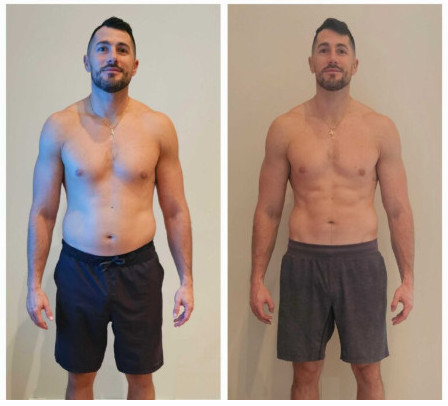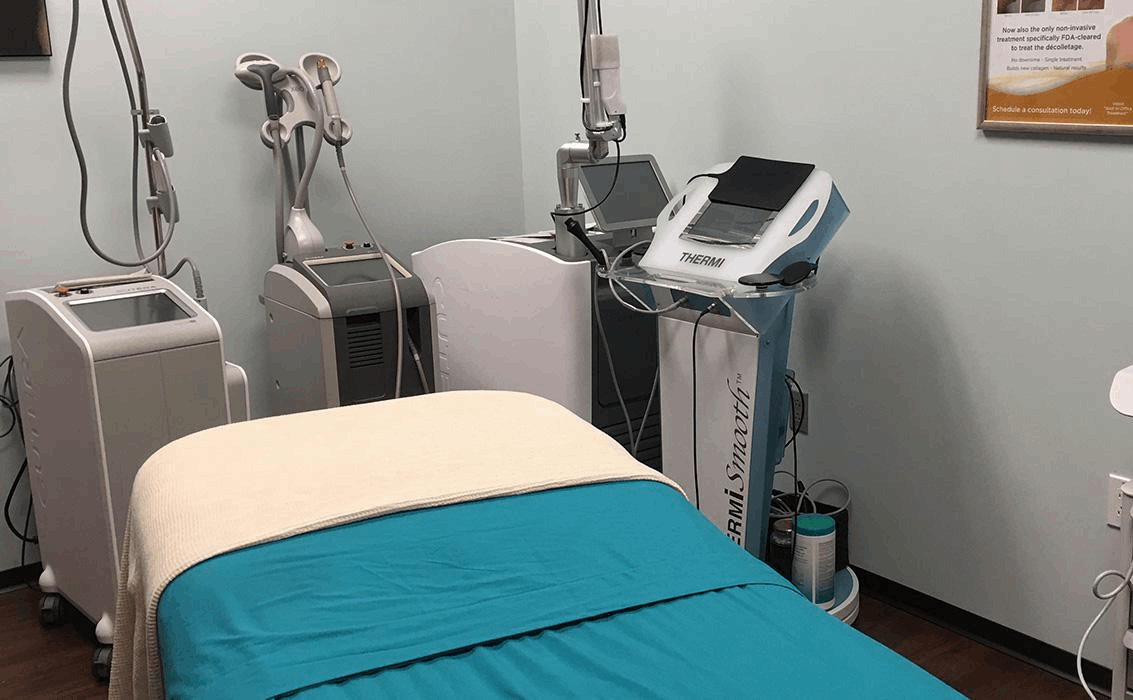Introduction
Testosterone is often overlooked in discussions about women’s health, yet it plays a crucial role in maintaining muscle mass, regulating fat distribution, and supporting overall well-being. As women age and hormone levels fluctuate, low testosterone can lead to unexpected weight gain and health challenges, especially around menopause.
What can women do to navigate these hormonal shifts and reclaim their health while managing weight effectively? This article explores the intricate relationship between testosterone and weight gain, offering insights and actionable strategies for women seeking to enhance their wellness journey. Together, we can address these concerns and find ways to thrive.
Explore the Role of Testosterone in Body Function
Testosterone is a vital hormone for women’s health, significantly influencing various bodily functions. It plays a crucial role in developing muscle mass and maintaining bone density, while also regulating fat distribution, which can be affected by testosterone weight gain. Many women may not realize that a lack of this hormone can contribute to testosterone weight gain, leading to a reduction in muscle mass and an increase in body fat, especially as they age. Research has shown a significant link between hormone levels and bone mineral density (BMD) in older women, indicating that lower hormone levels may elevate the risk of osteoporosis. This is particularly concerning, as one in seven women will develop osteoporosis after age 50, with many experiencing fractures due to significant bone density loss.
Endocrinologists emphasize the importance of this hormone for muscle mass and bone health. One expert noted that testosterone not only aids in muscle development but also contributes to overall energy levels and mood regulation. This multifaceted role highlights the significance of testosterone weight gain in the context of weight management and overall well-being. As hormone levels naturally decrease with age, understanding its impact becomes essential for addressing hormonal imbalances that can affect health outcomes.
At Woodlands Wellness & Cosmetic Center, we understand the importance of individualized hormone replacement treatment in addressing these concerns. Our personalized hormone therapy, along with other hormone-related services like thyroid health support, has shown promise in enhancing muscle mass and bone density, which can contribute to testosterone weight gain. Research suggests that individuals undergoing hormone therapy report notable improvements in symptoms associated with low libido and mood disorders. This emphasizes the potential benefits of hormone treatment in improving the quality of life for women facing hormonal deficiencies.
Together, we can explore how our services can support you on your wellness journey. Schedule a consultation at our premier wellness center online or by phone, and take the first step towards feeling your best!
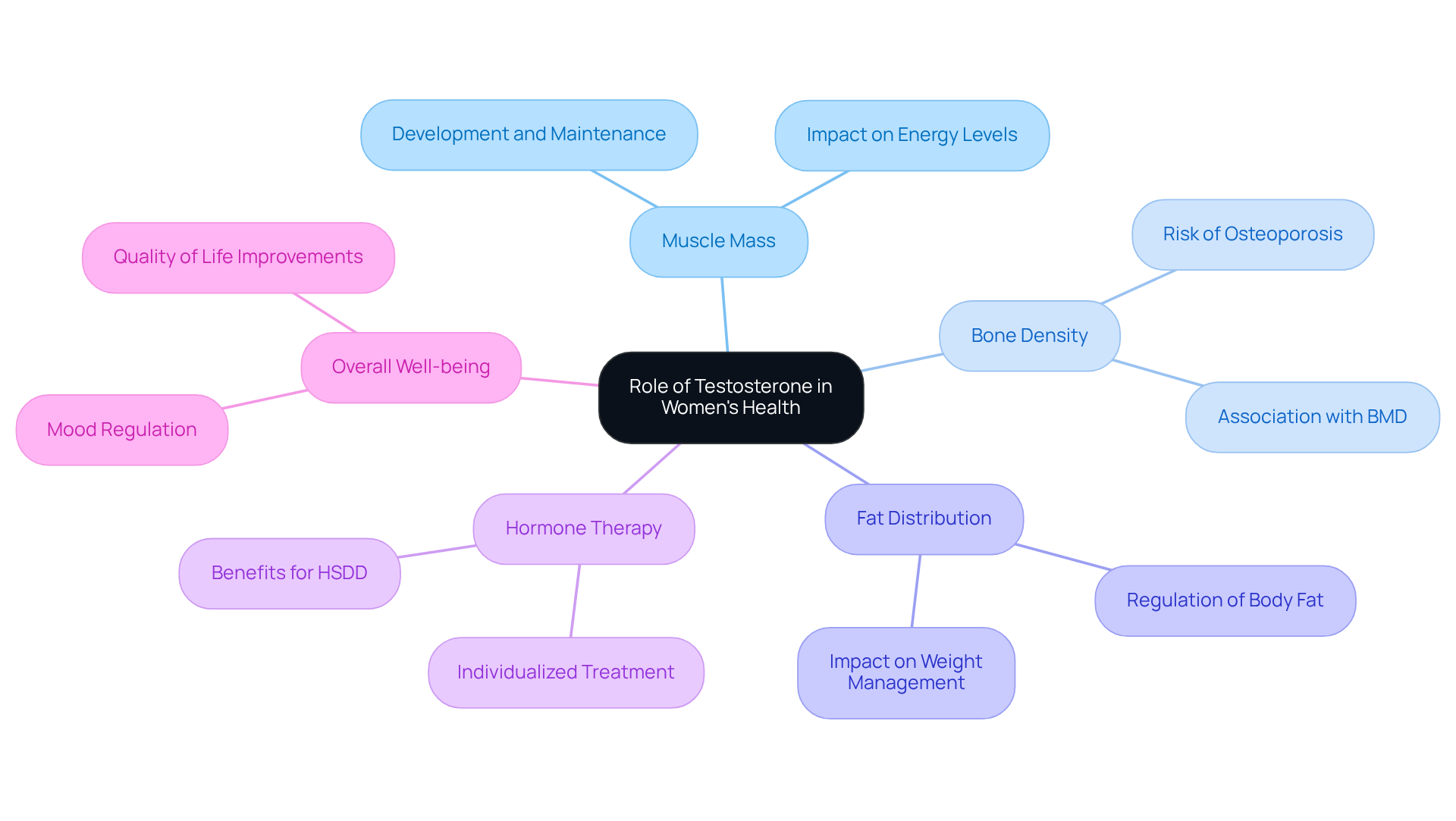
Analyze How Low Testosterone Contributes to Weight Gain
Reduced hormone levels in women can significantly lead to an increase in body mass through various mechanisms. We understand how challenging this can be. When testosterone levels decrease, it can lead to muscle loss and subsequently result in testosterone weight gain, which lowers metabolic rate and increases body mass. Furthermore, low testosterone levels are often linked to testosterone weight gain, especially in the abdominal area, as the body becomes less efficient at burning fat.
A simple blood examination can assess hormone levels, providing valuable insights for women experiencing increased body mass. Research shows that individuals with reduced testosterone frequently experience testosterone weight gain, leading to higher amounts of visceral fat, a type of fat associated with serious health risks like metabolic syndrome and cardiovascular disease. Together, we can address these concerns. Low testosterone can also lead to elevated blood sugar levels and insulin resistance, making testosterone weight gain more difficult to manage in terms of body composition.
Understanding these connections is vital, especially for those facing unexplained weight gain during menopause, as testosterone weight gain and other hormonal changes can exacerbate these issues. To effectively manage weight, it’s essential to focus not just on the scale but on body composition analysis. This approach allows individuals to monitor fat loss and muscle gain, providing a clearer picture of their health and progress.
Body composition analysis serves as a valuable tool for tracking fitness progress, helping individuals look beyond the misleading numbers on a bathroom scale. Have you noticed changes in your body? Case studies reveal that individuals with low hormone levels often experience significant shifts in body composition, emphasizing the role of testosterone weight gain in addressing hormonal health within weight management strategies. Let’s take this journey together towards better health and wellness.
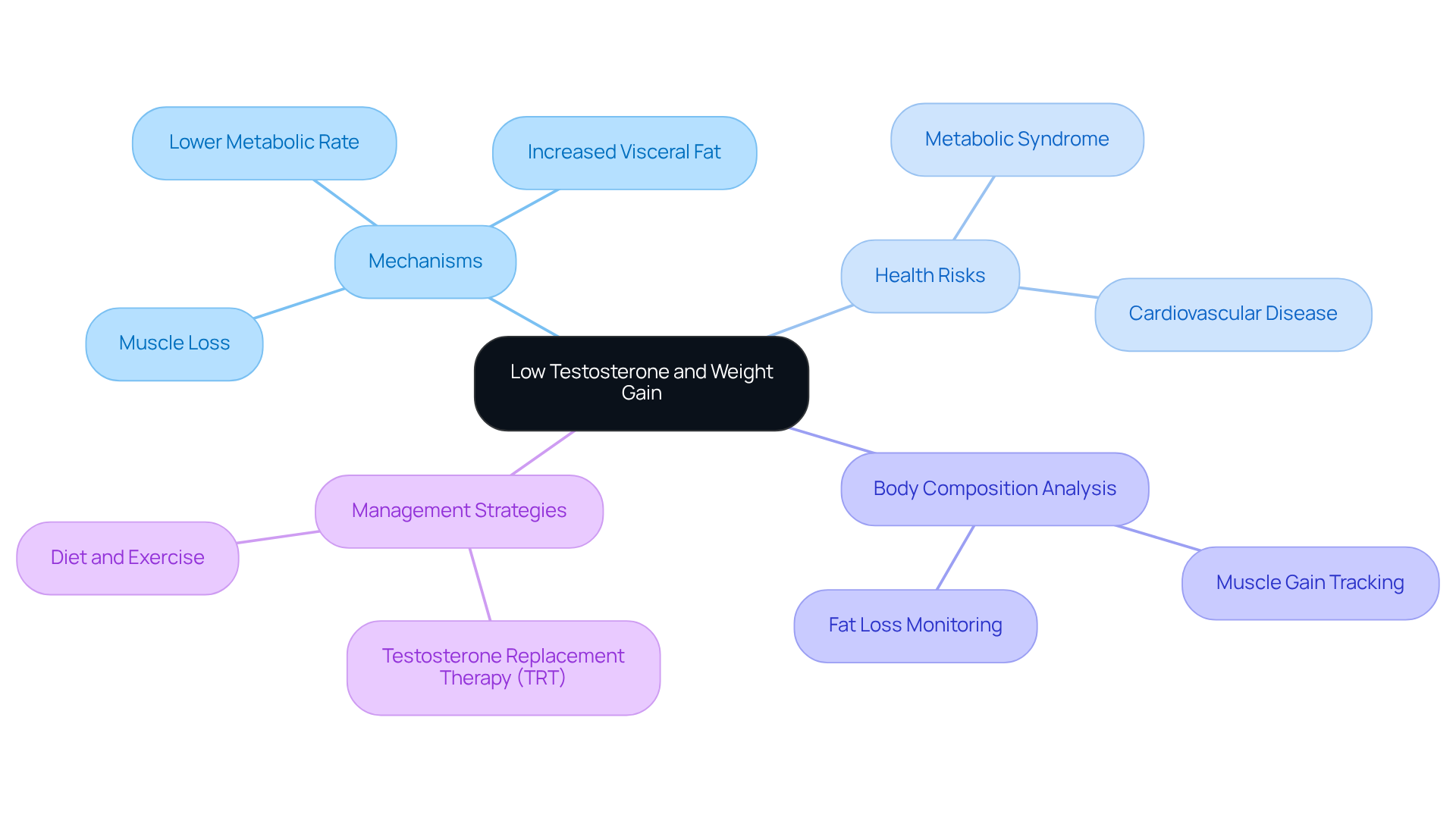
Evaluate the Effects of Testosterone Therapy on Weight Management
Hormone treatment can be a game-changer for middle-aged women facing challenges with weight control due to low hormone levels. At Woodlands Wellness & Cosmetic Center, we understand how important it is to feel your best, and our dedicated team is here to offer personalized hormone replacement solutions tailored just for you. We also provide comprehensive treatments for thyroid health, ensuring a holistic approach to your wellness journey.
Research shows that hormone replacement can lead to an increase in lean muscle mass, which not only boosts your metabolic rate but also aids in fat reduction. Imagine feeling more energetic and confident in your body! Additionally, hormone treatment may help decrease visceral fat and improve your overall body composition, making a significant difference in how you feel day-to-day.
However, it’s essential to approach hormone treatment with care. While there are many benefits, side effects can occur, such as potential testosterone weight gain from water retention or increased muscle size. That’s why a thorough assessment by our medical experts is crucial. Together, we can determine if hormone treatment aligns with your personal health goals and needs.
If you’re ready to explore how hormone treatment can support your wellness journey, we invite you to reach out to us. Let’s take this step together towards a healthier, happier you!
Implement Strategies for Effective Weight Management During Therapy
To effectively manage weight during testosterone therapy, it’s important to consider some supportive strategies that can make a real difference:
-
Balanced Diet: We understand how challenging it can be to maintain a healthy diet. Emphasizing a nutrient-dense diet that includes lean proteins, healthy fats, and whole grains can truly help. Research shows that incorporating a balanced diet can enhance fat loss by about 1.6 kg when paired with exercise. This approach not only supports muscle development but also helps maintain hormonal balance, which is crucial during treatment.
-
Regular Exercise: Finding the right exercise routine can feel overwhelming, but incorporating a mix of strength training and cardiovascular exercises is essential. Regular physical activity, especially strength training, maximizes the benefits of testosterone replacement therapy (TRT). Strength training builds muscle mass, while cardiovascular workouts promote fat loss and improve overall fitness.
-
Monitor Caloric Intake: Keeping track of your daily caloric consumption is vital for reaching your fat loss goals. Aim for a caloric deficit by adjusting portion sizes based on your activity level and dietary needs. It’s important to manage caloric intake carefully to avoid unwanted testosterone weight gain while undergoing TRT.
-
Stay Hydrated: Staying hydrated is crucial for controlling water retention and supporting metabolic functions. This can be especially beneficial during testosterone treatment, as proper hydration helps mitigate the effects of water retention that some may experience.
-
Sleep and Stress Management: Prioritizing quality sleep and utilizing stress-reduction techniques can significantly impact hormone levels and treatment outcomes. Ensuring you get enough rest and managing stress effectively can enhance the effectiveness of your therapy.
-
Body Composition Analysis: Instead of solely relying on the bathroom scale, consider focusing on body composition analysis to track your progress. This method measures muscle, fat, and water levels, allowing you to concentrate on losing excess body fat while gaining muscle. Tools like bioelectrical impedance scales or DEXA scans can provide valuable insights into your body composition, helping you make informed choices about your management strategies.
-
Regular Check-ups: It’s essential to arrange regular follow-ups with your healthcare provider to monitor hormone levels and make necessary adjustments to your treatment. This ensures optimal results and allows your treatment plan to adapt to your evolving needs.
By integrating these strategies, you can enhance the benefits of testosterone therapy and achieve your testosterone weight gain goals more effectively. Remember, you’re not alone in this journey; together, we can navigate these changes and find what works best for you.
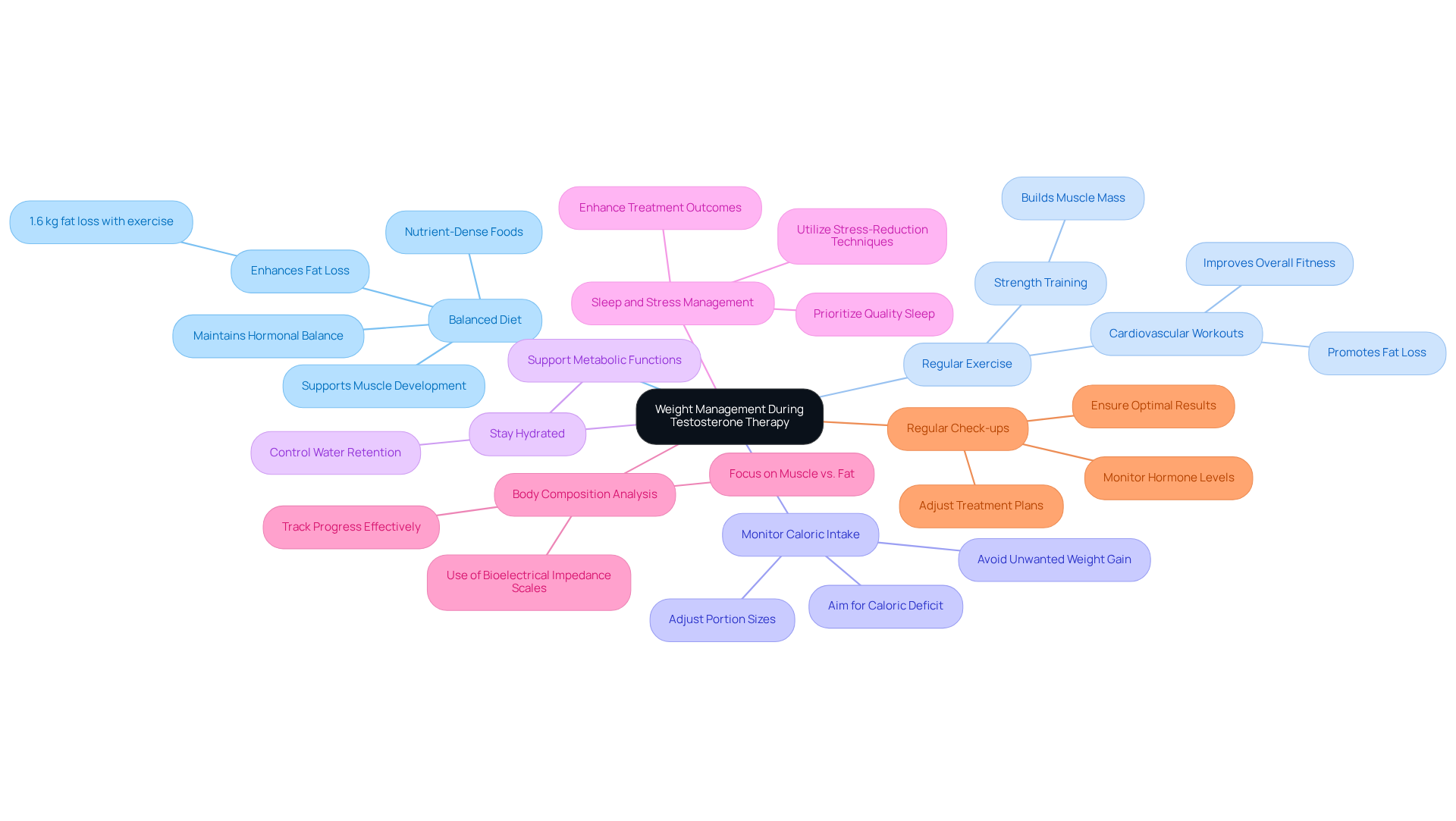
Conclusion
Understanding the relationship between testosterone and weight management is essential for women, especially as they face hormonal changes over time. It’s important to recognize that testosterone plays a vital role not just in muscle mass and bone density, but also in fat distribution and overall body composition. When women understand the impact of low testosterone levels, they can take meaningful steps toward managing their health and wellness.
Reduced testosterone levels can lead to muscle loss, increased body fat, and a lower metabolic rate, all contributing to weight gain. This is where hormone replacement therapy can shine as a promising solution. It offers benefits like increased lean muscle mass and improved body composition. Furthermore, implementing supportive strategies – such as a balanced diet, regular exercise, and body composition analysis – can enhance the effectiveness of testosterone therapy, helping women achieve their weight management goals.
Ultimately, the journey toward better health and wellness is a collaborative effort. By understanding the significance of testosterone in women’s health and utilizing available resources, individuals can make informed decisions that lead to an improved quality of life. Together, we can embrace lifestyle changes and seek personalized hormone therapy, paving the way for a healthier future. Let’s empower ourselves to feel our best and thrive in our daily lives.
Frequently Asked Questions
What role does testosterone play in women’s health?
Testosterone is vital for women’s health as it influences muscle mass development, maintains bone density, and regulates fat distribution.
How does a lack of testosterone affect women’s bodies?
A lack of testosterone can lead to reduced muscle mass, increased body fat, and may contribute to weight gain, especially as women age.
What is the connection between testosterone levels and osteoporosis?
Research indicates a significant link between hormone levels and bone mineral density (BMD) in older women. Lower testosterone levels can elevate the risk of osteoporosis, with one in seven women developing it after age 50.
How does testosterone impact energy levels and mood?
Testosterone aids in muscle development and contributes to overall energy levels and mood regulation, highlighting its importance for well-being.
What are the benefits of hormone replacement therapy for women?
Personalized hormone replacement therapy can enhance muscle mass, bone density, and improve symptoms associated with low libido and mood disorders, thus improving the quality of life for women facing hormonal deficiencies.
How can I learn more about hormone therapy services?
You can schedule a consultation at Woodlands Wellness & Cosmetic Center online or by phone to explore hormone therapy services and how they can support your wellness journey.



